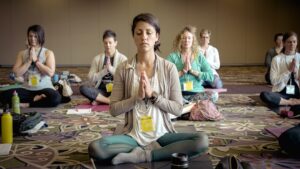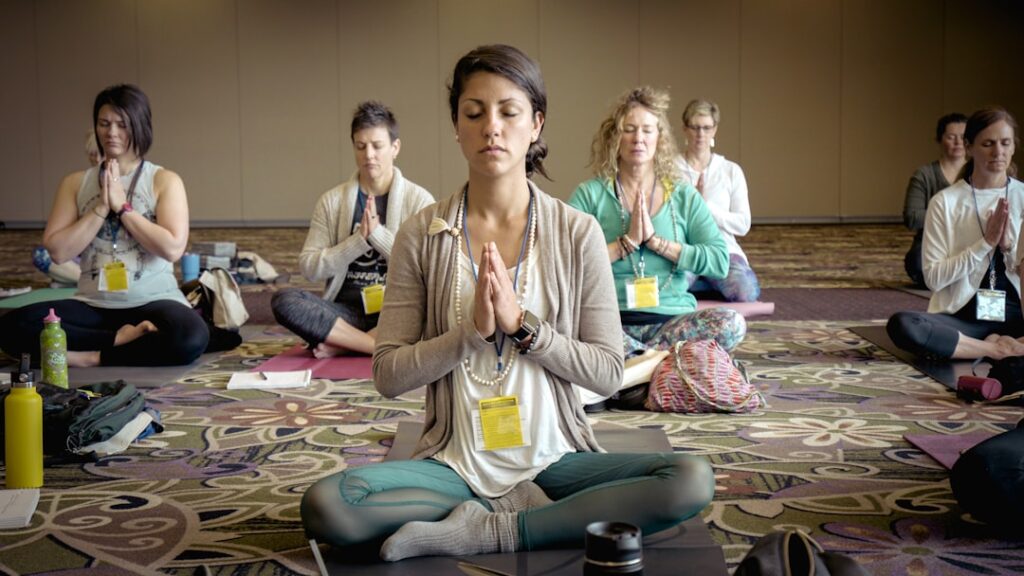Yoga is an ancient practice originating in India, with a history spanning thousands of years. It offers a comprehensive approach to health and well-being, integrating mind, body, and spirit. For those new to yoga, it serves as a gentle introduction to fitness and mindfulness.
The practice incorporates physical postures, breathing exercises, and meditation techniques that can enhance flexibility, strength, and mental clarity. Yoga’s versatility allows it to be adapted to individual needs and abilities, making it accessible to people of various ages and fitness levels. Beyond physical exercise, yoga is a method for cultivating inner peace and balance.
Beginners may find it a transformative experience that facilitates self-discovery and personal growth. Yoga offers numerous benefits for those seeking to improve physical fitness, reduce stress, or achieve inner calm. This article will examine the physical, mental, emotional, and spiritual advantages of yoga for beginners, provide guidance on starting a yoga practice, and address common misconceptions about the discipline.
Key Takeaways
- Yoga is a holistic practice that combines physical postures, breathing techniques, and meditation to promote overall well-being for beginners.
- Physical benefits of yoga for beginners include improved flexibility, strength, and balance, as well as relief from chronic pain and better posture.
- Yoga can help beginners manage stress, reduce anxiety, and improve mental clarity and focus, leading to enhanced emotional well-being.
- Spiritual benefits of yoga for beginners may include a deeper connection to oneself, increased self-awareness, and a sense of inner peace and contentment.
- Tips for starting a yoga practice as a beginner include finding a qualified instructor, starting with basic poses, and listening to your body’s limits and needs.
Physical Benefits of Yoga for Beginners
Physical Benefits
Through regular practice, beginners can expect to see improvements in their range of motion, muscle tone, and overall physical fitness. Yoga can also help to alleviate chronic pain and improve posture, which can have a positive impact on daily activities and reduce the risk of injury.
Weight Management and Healthy Lifestyle
Furthermore, yoga can be a great way to manage weight and promote a healthy lifestyle. The physical exertion involved in yoga practice can help to burn calories and build lean muscle mass, which can contribute to weight loss and improved body composition.
Mindfulness and Healthy Choices
The mindfulness aspect of yoga can help beginners to become more attuned to their body’s needs and make healthier choices when it comes to diet and lifestyle. Overall, the physical benefits of yoga for beginners are numerous and can have a lasting impact on overall health and well-being.
Mental and Emotional Benefits of Yoga for Beginners

In addition to the physical benefits, yoga also offers a wide range of mental and emotional benefits for beginners. The practice of yoga involves mindfulness and meditation techniques that can help to reduce stress, anxiety, and depression. Through focused breathing and meditation, beginners can learn to quiet the mind and cultivate a sense of inner peace and calm.
This can have a profound impact on mental well-being, helping beginners to manage the challenges of daily life with greater ease and resilience. Furthermore, yoga can also help beginners to improve their mental clarity and focus. The practice of yoga involves concentration and awareness, which can help to sharpen cognitive function and improve memory and attention span.
This can be particularly beneficial for beginners who are looking to enhance their mental acuity and overall cognitive function. Additionally, the sense of community and support that is often found in yoga classes can help beginners to feel more connected and less isolated, which can have a positive impact on emotional well-being.
Spiritual Benefits of Yoga for Beginners
| Benefits | Details |
|---|---|
| Stress Reduction | Yoga helps beginners to reduce stress and anxiety through breathing exercises and meditation. |
| Increased Awareness | Practicing yoga can help beginners to become more aware of their body, mind, and emotions. |
| Inner Peace | Yoga can lead beginners to experience a sense of inner peace and calmness. |
| Connection to Spirituality | Yoga can help beginners to connect with their spiritual side and explore their inner self. |
Yoga is often associated with spirituality, and for beginners, it can be a powerful tool for exploring one’s inner world and connecting with a sense of higher purpose. The practice of yoga involves connecting with the breath and the body, which can help beginners to cultivate a sense of mindfulness and presence. This can lead to a deeper connection with oneself and a greater sense of self-awareness.
Additionally, the practice of yoga can help beginners to tap into their inner wisdom and intuition, which can be a source of guidance and inspiration. Furthermore, yoga can also be a way for beginners to explore their spiritual beliefs and connect with something greater than themselves. The practice of yoga is rooted in ancient wisdom and traditions that offer a rich tapestry of spiritual teachings and practices.
For beginners who are seeking a deeper sense of meaning and purpose in life, yoga can be a transformative journey that opens up new possibilities for spiritual growth and self-discovery.
Tips for Starting a Yoga Practice as a Beginner
Starting a yoga practice as a beginner can be an exciting and rewarding experience. However, it is important to approach the practice with an open mind and a willingness to learn. Here are some tips for beginners who are looking to start a yoga practice: 1.
Find the right class: Look for beginner-friendly classes at local yoga studios or community centers. Many studios offer introductory classes specifically designed for beginners. 2.
Invest in quality gear: While you don’t need much equipment to start practicing yoga, investing in a good quality mat and comfortable clothing can make the experience more enjoyable. 3. Start slow: It’s important for beginners to start slow and listen to their bodies.
Don’t push yourself too hard in the beginning; instead, focus on building a strong foundation and gradually increasing your practice. 4. Be consistent: Consistency is key when it comes to yoga practice.
Try to establish a regular routine that works for you, whether it’s practicing at home or attending classes several times a week. 5. Be patient: Yoga is a journey, not a destination.
Be patient with yourself as you navigate the ups and downs of your practice, and remember that progress takes time.
Common Misconceptions about Yoga for Beginners

Flexibility is Not a Prerequisite
One of the most common misconceptions about yoga is that you need to be flexible to practice. In reality, yoga is for everyone, regardless of age or flexibility level. Regular practice can even help improve flexibility over time.
Yoga is for Everyone, Regardless of Gender
Another myth is that yoga is only for women. While it’s true that women make up the majority of yoga practitioners, men can also benefit from the physical, mental, and emotional benefits of yoga.
Debunking the Pace and Spirituality Myths
Some people think that yoga is too slow-paced or not challenging enough, but there are many different styles of yoga, some of which are quite vigorous and physically demanding. Additionally, while yoga has spiritual roots, it’s not necessary to embrace any specific spiritual beliefs to practice. Yoga can be adapted to suit individual beliefs and preferences.
Yoga is More Accessible Than You Think
Finally, some people may think that yoga is too expensive, but there are many affordable options available, including community classes and online resources. With a little exploration, you can find a yoga practice that fits your budget and lifestyle.
Embracing the Benefits of Yoga for Beginners
In conclusion, yoga offers a wide range of physical, mental, emotional, and spiritual benefits for beginners. Whether you are looking to improve your physical fitness, reduce stress, or connect with your inner self on a deeper level, yoga has something to offer everyone. By dispelling common misconceptions about yoga and providing tips for starting a practice as a beginner, more people can experience the transformative power of this ancient practice.
With an open mind and a willingness to learn, beginners can embark on a journey of self-discovery and personal growth through the practice of yoga.
If you’re just starting out with yoga, you may want to check out this article on the benefits of using a handmade yoga bag to carry your gear to and from class. Not only does it provide a convenient way to transport your mat and other essentials, but it also adds a touch of style to your practice. Handmade Bag Shop offers a variety of beautifully crafted bags that are perfect for beginners looking to enhance their yoga experience.
FAQs
What is yoga?
Yoga is a physical, mental, and spiritual practice that originated in ancient India. It involves a combination of physical postures, breathing techniques, and meditation to promote overall health and well-being.
What are the benefits of yoga for beginners?
Yoga can help beginners improve flexibility, strength, and balance. It also promotes relaxation, reduces stress, and can improve mental clarity and focus.
What do I need to start practicing yoga?
To start practicing yoga, beginners will need a yoga mat, comfortable clothing that allows for movement, and a quiet space to practice. It’s also helpful to have a water bottle and a towel.
Are there different types of yoga for beginners to try?
Yes, there are many different types of yoga, each with its own focus and intensity level. Some popular types of yoga for beginners include Hatha, Vinyasa, and Yin yoga.
Is yoga suitable for all ages and fitness levels?
Yes, yoga is suitable for people of all ages and fitness levels. Beginners can start with gentle, beginner-friendly classes and gradually progress to more challenging practices as they build strength and flexibility.
How often should beginners practice yoga?
For beginners, it’s recommended to start with 2-3 yoga sessions per week to allow the body to adapt to the practice. As they become more comfortable, they can gradually increase the frequency of their practice.





